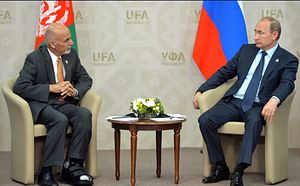On October 30, 2017, a delegation of 20 prominent Russian businessmen arrived in Afghanistan to negotiate with Kabul over an expansion of Russian investments in Afghanistan’s agriculture, transport, and mining sectors. These negotiations resulted in a joint pledge to substantially increase annual trade turnovers between Russia and Afghanistan, deepening Moscow’s economic links to the war-torn country.
As the profitability of economic investments in Afghanistan is highly uncertain due to the country’s ongoing political instability, Russia’s commitment to stronger commercial ties with Afghanistan is intriguing. A closer examination of Russian conduct in Afghanistan reveals that Moscow’s investments in Afghan economic development initiatives and military assistance provisions to Kabul are part of a broader strategy to rebrand Russia’s image in Afghanistan.
Russian policymakers believe that economic development investments will help counter negative memories of the Soviet war in Afghanistan and improve Moscow’s relationship with Afghanistan’s legitimate government. If Russia manages to gain public support for its involvement in Afghanistan and forge strong links with Afghan government officials, Kremlin policymakers believe that President Ashraf Ghani could be willing to cooperate with Moscow on resolving Afghanistan’s political crisis.
The linkage between Russia’s economic development initiatives and Moscow’s pursuit of soft power in Afghanistan is revealed most compellingly by its expanded role in assisting Afghanistan’s infrastructure development. The Soviet Union’s instrumental role in the development of civilian infrastructure in Afghanistan prior to the outbreak of war in December 1979 is a source of nostalgia for many Afghans seeking a return to political stability.
The decades-long survival of numerous Soviet-era construction projects, like the Salang tunnel, which links Kabul to northern Afghanistan, and Afghanistan-Uzbekistan Friendship Bridge, has been highlighted by advocates of expanded Russian involvement in Afghanistan. In March 2014, former Afghan President Hamid Karzai praised the Soviet Union for its efficient investments in the Afghan economy. Karzai’s comments aimed to contrast the Soviet Union’s “constructive” investments with “destructive” U.S. development assistance initiatives, which are regarded by many Afghan policymakers as facilitators of corruption in Afghanistan.
The Russian state media’s frequent contrasts between “ineffective” U.S. investments and “effective” Soviet development initiatives has helped foster pro-Kremlin sentiments in Afghanistan. As Arturo Munoz, a political scientist at the RAND Corporation, noted in a July 2017 article, the Kremlin’s coverage of corrupt actions by U.S.-aligned politicians in Afghanistan has increased the attractiveness of Russian economic reconstruction proposals.
A series of 2014 interviews by the Washington Post’s Kevin Sieff provided some empirical evidence for the enduring popularity of Soviet economic development projects in Afghanistan. In an interview with Sieff, Afghan National Army (ANA) General Labib Raeed praised Soviet housing complexes for being the only forms of accommodation with workable central heating. The prevalence of positive attitudes toward Soviet economic development efforts, even among Afghans who lost relatives in the Soviet war in Afghanistan, demonstrates that Russian infrastructure investments can help foster pro-Kremlin sentiments in Afghanistan.
Russian policymakers have also used military assistance provisions to improve Afghan elite perceptions of Russia. In February 2016, the Russian government authorized the donation of 10,000 automatic rifles and a million rounds of ammunition to Kabul. This donation was widely praised in Afghanistan and helped reduce the backlash associated with Russia’s alleged arms provisions to the Taliban.
Historical links between the Russian and Afghan militaries help explain the popular resonance of these arms deals. As Ekaterina Stepanova, an expert on Afghanistan at Moscow’s IMEMO Institute, noted in our recent interview, many Afghan military officers were trained in Soviet combat techniques. The widespread use of the Russian language in the Afghan military and Afghanistan’s continued use of Kalashnikov rifles explains the symbolic value of Russian arms donations to Afghanistan.
Historical memories of the Soviet war in Afghanistan have also shaped Kabul’s enthusiastic response to Russian military assistance. As Munoz notes, many Afghans believe that the USSR’s failed invasion was due to financial constraints, rather than strategic ineptitude. This popular perception contrasts markedly with the perceived inefficacy of Washington’s anti-Taliban campaign, and has increased Kabul’s interest in Russian military technology.
Arguments supporting the effectiveness of the Russian military became more widely accepted in Afghanistan after the Kremlin intervened militarily in Syria in September 2015. Even though Russia’s military intervention in Syria has principally targeted rebel forces, rather than Islamic State (ISIS) held targets, Moscow’s effective use of hybrid warfare on Assad’s behalf caused Afghan militias to express interest in Russian counterterrorism techniques.
In October 2015, Afghanistan’s Vice President Abdul Rahsid Dostum travelled to Moscow and Chechnya to consult with Russian policymakers on how best to combat the Taliban in Kunduz. Two months later, Haji Mohammed Mahdiyar, the leader of northern Afghanistan’s Marg militia, requested military assistance from Russia against ISIS and attempted to co-opt Moscow by highlighting the threat posed by ISIS in Afghanistan to Central Asia.
As the opinions of pro-Kremlin officials in Afghanistan carry considerable weight, Russia’s efforts to frame itself as a constructive actor in Afghanistan have received a considerable boost. This ensures that Russia’s military assistance provisions to Afghanistan are likely to continue for the foreseeable future.
Even though Russian involvement in Afghanistan continues to be hampered by negative memories of the Soviet war in Afghanistan, Moscow has attempted to rebrand its image in Afghanistan. Through targeted economic investments and military assistance provisions, Russian officials have reminded Afghans of the USSR’s positive contributions to Afghanistan’s economy and the Russian military’s effectiveness as a counterterrorism force. If pro-Kremlin sentiments continue to rise among Afghan officials, Moscow’s diplomatic role in the Afghan political crisis will likely increase, to the detriment of U.S. influence in Afghanistan.
Samuel Ramani is a DPhil candidate in International Relations at St. Antony’s College, University of Oxford. He is also a journalist who contributes regularly to the Washington Post and Huffington Post. He can be followed on Twitter at samramani2 and on Facebook at Samuel Ramani.

































